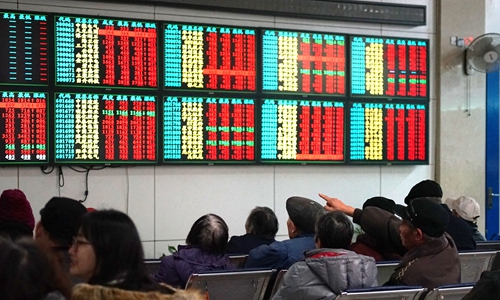HOME >> SOURCE
China launches guidelines to speed market-oriented financial reforms
By Xie Jun Source:Global Times Published: 2020/4/9 22:18:40

People at Shenwan Hongyuan Securities exchange in Shanghai on Thursday Photo: Yang Hui/GT
From promoting the convertibility of the yuan in the capital account to establishing a securities civil litigation system, the State Council, China's cabinet, has rolled out scores of guidelines to speed up market-oriented reform of the capital markets, which one economist said reflected "a slight change of thinking" by the government to move away from an overly stringent focus on financial risk prevention.
"Some local governments in China have been too cautious about financial risks in recent years, which slowed the progress of financial reforms. I think the central government wants to make some changes to the situation," said Xi Junyang, a professor at the Shanghai University of Finance and Economics.
Among the guidelines on financial reforms, China is looking to perfect the stock issuance, trading and delisting systems. It will also encourage cash dividends by listed companies, according to a report by the Xinhua News Agency on Thursday.
Some measures, such as establishing a securities civil litigation system, were hailed by Xi as being "groundbreaking" as they would fundamentally increase protection for individual investors.
China's stock markets have shown resilience and stability in the face of the coronavirus pandemic, compared with the sliding US stock market. Domestic shares have slowly climbed since late March.
"China's stock markets are now very large in scale and investors are growing increasingly mature, which means that the markets won't be strongly swayed by external influences, and that includes market reforms," Xi told the Global Times.
He also anticipated that Chinese mainland stock markets might increase the daily trading limit from 10 percent to 15 percent this year, while adopting the T+0 settlement system.
Apart from speeding these reforms, China would further relax market access for the financial services industry, push the yuan's internationalization, increase the bond market's scale and encourage domestic financial institutions to take part in global financial markets, Xinhua reported.
Those are also parts of a large basket of measures the State Council rolled out to stimulate the "free flow of factors" in the country, such as deepening household registration reforms and pushing the sharing of government data.
"China is looking to increase the efficiency of economic operations by giving a boost to market-oriented reforms," Xi said, adding that without such government-led stimulus, strong economic growth is very difficult to achieve.
Posted in: ECONOMY